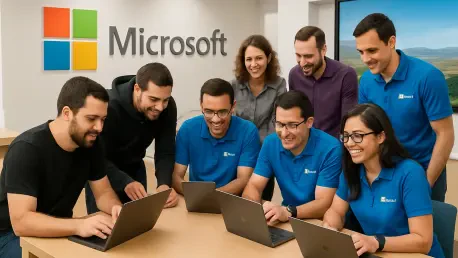In a landscape where app development can often feel like navigating a maze of financial and bureaucratic obstacles, a major tech player has taken a bold step to clear the path for creators worldwide. Microsoft has announced the elimination of the one-time $19 registration fee for individual developers looking to publish apps on the Microsoft Store, a move that signals a seismic shift in accessibility. This decision is not just about cutting costs; it’s a strategic effort to position the platform as a haven for innovation, inviting developers from nearly 200 countries to tap into an audience of 250 million monthly active users. By removing this barrier, Microsoft is challenging the status quo set by competitors who still impose fees, and it underscores a broader industry trend toward inclusivity. The implications of this change ripple beyond mere economics, promising to reshape how individual developers engage with one of the world’s largest app ecosystems.
Breaking Down Financial Barriers
This policy overhaul brings with it a host of changes designed to make the Microsoft Store a more welcoming space for individual developers. Gone is the need for a credit card during registration; instead, a personal Microsoft account suffices, coupled with a streamlined identity verification process involving a government-issued ID and a selfie. This approach prioritizes security while ensuring that financial constraints don’t deter talent from joining the platform. Furthermore, Microsoft is offering free app signing, a feature that bolsters trust for both developers and users by verifying the authenticity of submissions. The registration process itself has been refined for speed, allowing developers to access the Partner Center almost instantly after verification and submit apps within minutes. This stands in sharp contrast to the often tedious procedures on rival platforms, highlighting Microsoft’s intent to prioritize ease of access and efficiency in fostering a vibrant developer community.
Empowering Innovation Through Flexibility
Beyond eliminating upfront costs, Microsoft is also redefining how developers can profit from their creations, offering a revenue model that caters to diverse needs. Those utilizing Microsoft’s commerce platform will encounter a 15% fee for apps and a 12% fee for games, while developers who integrate their own in-app commerce systems can keep 100% of their earnings. This flexibility subtly critiques the more rigid structures of other tech giants and positions Microsoft as a champion of developer autonomy. Support for a wide array of app frameworks, including Win32, UWP, PWA, and .NET MAUI, ensures compatibility for a broad spectrum of projects. Looking back, this initiative reflected a pivotal moment when Microsoft chose to prioritize accessibility and trust, with free app signing and rapid submission processes setting a new standard. The focus on empowering creators to innovate without financial or technical hurdles marked a significant stride toward a more inclusive digital ecosystem for the millions of users engaging with the platform.









